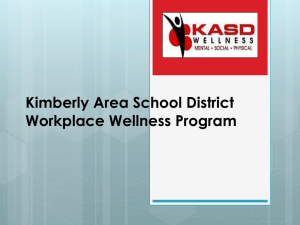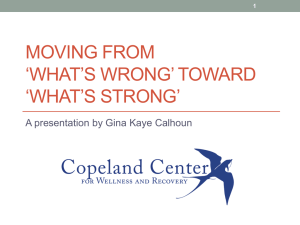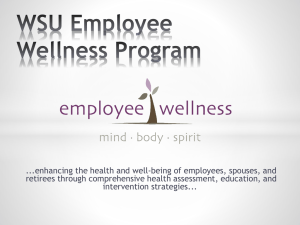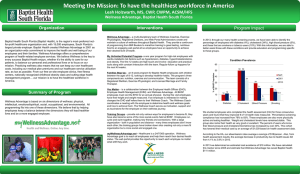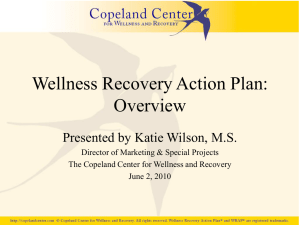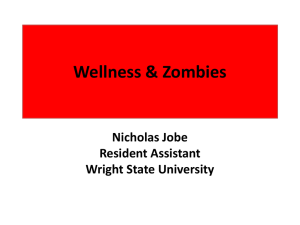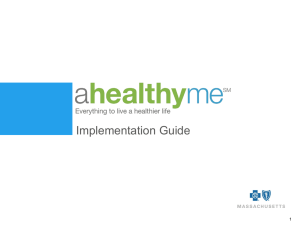Massachusetts Wellness Tax Credit Incentive.
advertisement
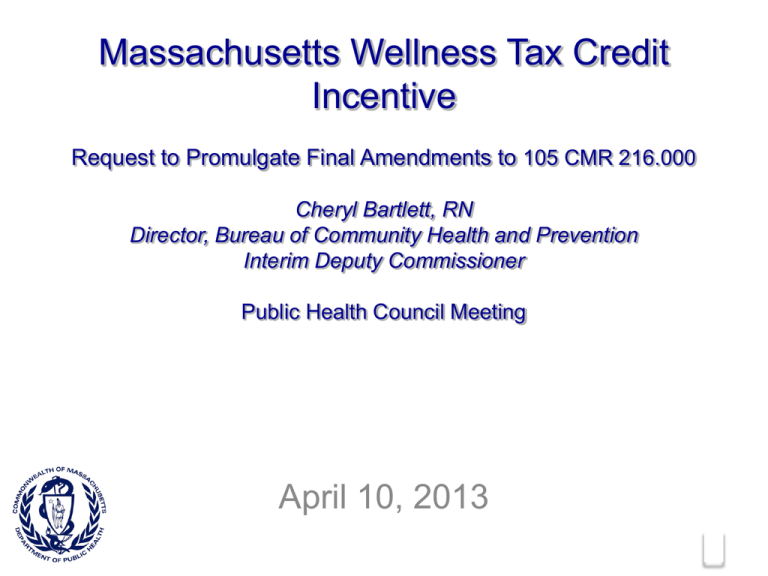
Massachusetts Wellness Tax Credit Incentive Request to Promulgate Final Amendments to 105 CMR 216.000 Cheryl Bartlett, RN Director, Bureau of Community Health and Prevention Interim Deputy Commissioner Public Health Council Meeting April 10, 2013 Agenda •Background •Summary of Public Comments •Next Steps and Request for Action 2 Background • August 4, 2012: Governor Deval Patrick approved Chapter 224: An Act Improving the Quality of Health Care and Reducing Costs Through Increased Transparency, Efficiency and Innovation. • January 1, 2013: The effective date of sections of Chapter 224 that establish a Massachusetts wellness program tax credit. • January 10, 2013: The Public Health Council approved an emergency regulation. • February 2013: Opportunity for public comment on the emergency regulation – Hearings: February 11 and 14 – Public Comment period ended February 15 3 Agenda •Background •Summary of Public Comments •Next Steps and Request for Action 4 Commentors • Business - Retailers Association of Massachusetts; International Health, Racket and Sportsclub Association. • Providers – Health Promotional Specialists; Workplace Wellness Council of Massachusetts. • Insurers – Fallon Community Health Plan. • Advocacy groups – Health Care for All; Massachusetts Coalition for Occupational 5 Scope and Definition of Business Entity Comment(s) •Retailers Association of Massachusetts (RAM) requested that DPH limit scope and eligibility to small businesses in the Commonwealth’s small group insurance marketplace, as defined by regulations of the Division of Insurance (DOI). •DOI limits its definition of eligible small business to 50 or fewer employees. •The Affordable Care Act requires state small group markets to expand to businesses with 100 or fewer employees. 6 Scope and Definition of Business Entity Regulation Response •Revised the scope of this regulation, Section 216.003, and the associated definition of “business entity,” found in Section 216.004, to apply to business entities with 200 or fewer employees (not 500 or fewer employees). •The threshold of businesses with 200 or fewer employees: – Meets the spirit of the law to incentivize “smaller businesses” – Is consistent with research conducted by the Kaiser Family Foundation: Large firms (200 or more workers) are more likely than smaller firms (3-199 workers) to offer some type of wellness program. 7 Eligibility and Documentation Comment(s) •Massachusetts Coalition for Occupational Safety and Health and the Center for the Promotion of Health in the New England Workplace at UMASS Lowell raised concerns about unintended consequences. •The Commonwealth may inadvertently, absent explicit regulation, provide financial incentives to businesses that fail to pay into workers compensation or are non-compliant with legal obligations of employers, including wage and hour laws and occupational safety and health laws. 8 Scope and Definition of Business Entity Regulation Response •Strengthened eligibility criteria, Section 216.005(A), to require that the business is in compliance with all legal obligations of employers. •Added new Section 216.007(B)(7) requiring all applicants to sign an Affirmation that the business entity: – Complies with all legal obligations of employers, including M.G.L. c.149 & all applicable labor, licensing and tax laws; – Has purchased workers’ compensation insurance as required by law; 9 Voluntary Participation Comment(s) •Providers and advocates recommended that the regulation address the voluntary nature of employee participation. •Advocates recommended an express prohibition that businesses not be allowed to offer rewards or penalties. 10 Voluntary Participation Regulation Response •Revised eligibility criteria to add two new requirements that the business entity: – Inform all employees that participation in the health risk assessment and in the wellness program is voluntary. See, Section 216.005(G). – Ensure confidentiality of all employee information gathered through the wellness program and inform employees of this confidentiality policy. See, Section 216.005(H). 11 Definitions Comment(s) •Providers and advocates requested flexibility to assess workforce needs through anonymous surveys, and other means, to provide the employer with de-identified aggregate information. •Providers and advocates recommended revising definition of “wellness” to encourage overall well-being and focus on keeping health employees healthy, as opposed to concentrating on those with health conditions or risks. •One provider recommended that the definition of “wellness” specifically mention “physical activity incentives” such as health club memberships; however, advocates and researchers disagreed and questioned the benefit for low wage, minority/immigrant populations. 12 Voluntary Participation Regulation Response •Added a new definition: – Health Risk Assessment: means a systemic process for collection of information from individuals regarding health status and well-being so as to identify their health risk factors or chances of getting a disease or health condition. The aggregate results of such process guide the design of comprehensive workforce wellness 13 Third Party Insurers & Vendors Offering Common Wellness Programs Comment(s) Fallon Community Health Plan •Raised concerns that smaller business may not have the resources to develop a wellness program. •Recommended that regulations permit third parties to submit applications to the Department for certification of a common wellness program that the third party insurer or vendor may offer to different business entities. •Sought clarification about whether an employer could submit information about a portion of group premium costs that is attributable to implementation of a wellness program. 14 Third Party Insurers & Vendors Offering Common Wellness Programs Regulation Response •Added new eligibility criteria to permit businesses to work with third party vendors to implement wellness programming, See Section 216.005(J). •No change to Section 216.006(B). – The Department only has statutory jurisdiction to provide a certificate or seal of approval to wellness programs implemented by business entities, not third party insurers; – Under Section 216.006(B), the 15 Agenda •Background •Summary of Public Comments •Next Steps and Request for Action 16 Next Steps • Businesses must apply for certification to DPH annually by 12/31. • The Department anticipates that businesses will be able to apply online for Certification of their Wellness Program in the late spring of 2013. • The Department will issue FAQs and 17 Action Requested • The Department Respectfully Requests Final Approval of Amendments to 105 CMR 216.000: Massachusetts Wellness Tax Credit Incentive. 18 Thank You 19

